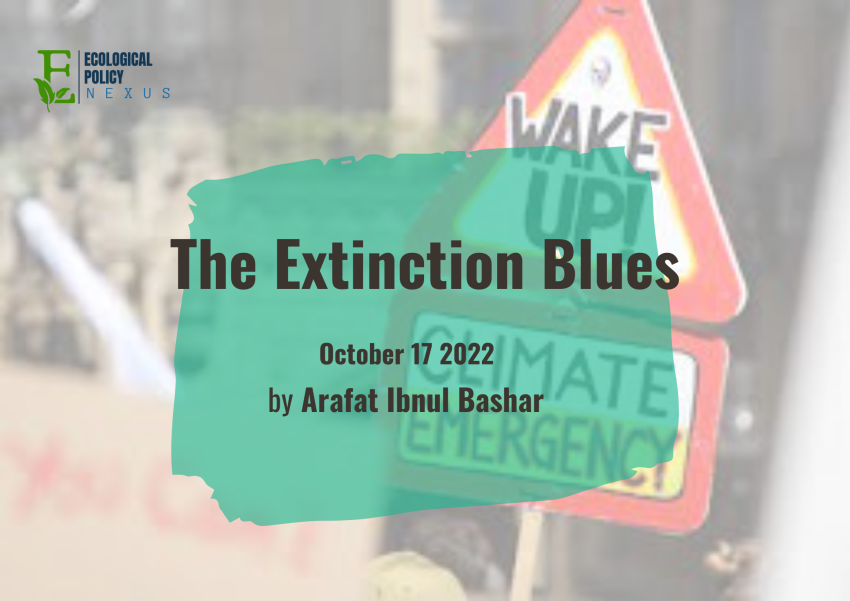Written by Arafat Ibnul Bashar
Are we, humans, on the verge of extinction? A recent study has stated that we might be ignoring the possibility of human extinction due to climate change. Here the word blues refers to feelings of melancholy or any song related to feelings of pensive sadness.
In this article, the author attempts to explore the indifference of humans toward their extinction and how it may cost them. A recent study has stated that the risk of global warming leading up to the extinction of humans is “dangerously under-explored.” The study published in the Journal Proceedings of the National Academy of Science has chalked out four key reasons to be alarmed about the global climate catastrophe – warnings from history i.e. how in the past societies have crumbled due to climate change, the potential of climate change to trigger conflicts and spread of diseases, the potential of climate change to make the existing vulnerabilities worse and making it impossible for humans to recover from any other catastrophe. Some existing studies have predicted that climate change may result in the extinction of 15-37% of land species by the year 2050.
The study follows the Sixth Assessment Report of the Intergovernmental Panel on Climate Change (IPCC). According to the IPCC Report, 40% of the world population currently falls under the category of ‘highly vulnerable’ to the impacts of climate change. The report extensively discusses the impact of Climate Change on human health, biodiversity loss, food security, water scarcity, migration and various other fields of human existence. The report has identified 127 negative impacts of climate change, with some of them being ‘irreversible.’
The extinction of Species is a recurring phenomenon. It has been estimated that over 99% of all the species that ever lived have become extinct. We, humans, have been responsible for the extinction of many species through the acts that led to the destruction of habitats. However, we have never stopped to think that even our time may be numbered. We as species have always considered ourselves invincible. Before the Age of Enlightenment, the overall concept of extinction or belief of human extinction in specific was viewed with scepticism. Major Religions of the world have talked about the notion of the end of times – an impending doom that will destroy life as we know it. As the scientific evidence on the extinction of different species was uncovered, the possibility of human extinction began to surface. With the development of weapons and an increase in wars and hostilities, the threat of human extinction due to our actions became a possibility. The threat of nuclear war and human extinction as its consequence has been the subject of discussion, deliberation and more. The creation of the United Nations, various regional arrangements, enactments of various treaties, conventions, declarations, etc. all have been in order to avoid nuclear warfare. Still, we have greatly overlooked the possibility of our extinction due to natural causes.
However, as every day new details on the impact of climate change surface, the possibility of human extinction in the hands of nature seems more realistic. We keep ignoring the reality due to the fact that climate change does not affect everyone, every nation similarly. While the island states in the Pacific are on the verge of being wiped from the World map completely, some states enjoy the development that is being fueled by Greenhouse Gasses. Maybe that is the reason why we have kept a blind eye towards the whole issue, i.e. not the whole of humanity will perish due to climate change. And we do not seem to consider it a crisis if there is no I-Kiribati or Maldivian left in the world. But as the study points out, climate change has the potential to trigger more conflicts and worsen the existing vulnerabilities – a side of the crisis which we have not yet evaluated. And most likely predicting and foreseeing this particular face of the crisis will not be possible. As the self-destructive activities of humans multiply on a regular basis, it will be almost impossible to contain the spillover of the impacts of climate change.
A practical illustration of this may be the issue of migration and displacement induced by the adverse impacts of Climate change. As low-lying lands become uninhabitable due to climate change, people are moving to climatically favourable highlands. With more people concentrated in the same area, the competition for limited resources is growing. Such ferocious competition for resources will cause a shortage of resources, with conflicts centring on availing these resources. Not to mention, the ever-looming threat of a nuclear war or wide-scale war has only increased in recent times. The Impacts of climate change will only accelerate the likelihood of such conflicts. As pointed out by the study, climate change will not only potentially set the stage for a larger global conflict but also make it impossible for us to recover from such conflicts.
Even if climate change does not extinct us completely, its impact coupled with the destructive nature of humans will likely cause our demise eventually. Some may feel that we are facing the consequences of our actions. Even though true, such cynic thoughts will hardly do anything to change our fate. Some may be inclined to believe that human extinction is inevitable, whatever the cause may be. Again such thoughts lead us astray from the fact that we have brought such calamity in our fate and still it is in our hands to reverse it. In case climate change wipes out only a part of humanity and not the whole, the demise of the I-Kiribati and Maldivians will signal the end of humanity, if not humankind.
References
- Kemp L., Xu C. & Depledge J. (2022). Climate Endgame: Exploring catastrophic climate change scenarios. Journal Proceedings of the National Academy of Science 119(34). Available online: (accessed on 9 October 2022). https://www.pnas.org/doi/10.1073/pnas.2108146119.
- Thomas C.D. et al (2004). Extinction risk from climate change. Nature 427(6970), 145-148.
- The Sixth Assessment Report of the Intergovernmental Panel on Climate Change (IPCC), IPCC. Available online: (accessed on 9 October 2022). https://www.ipcc.ch/assessment-report/ar6/.
- Newman M.E.J., (1997). A model of mass extinction. J. Theor. Biol 189, 235-252.

